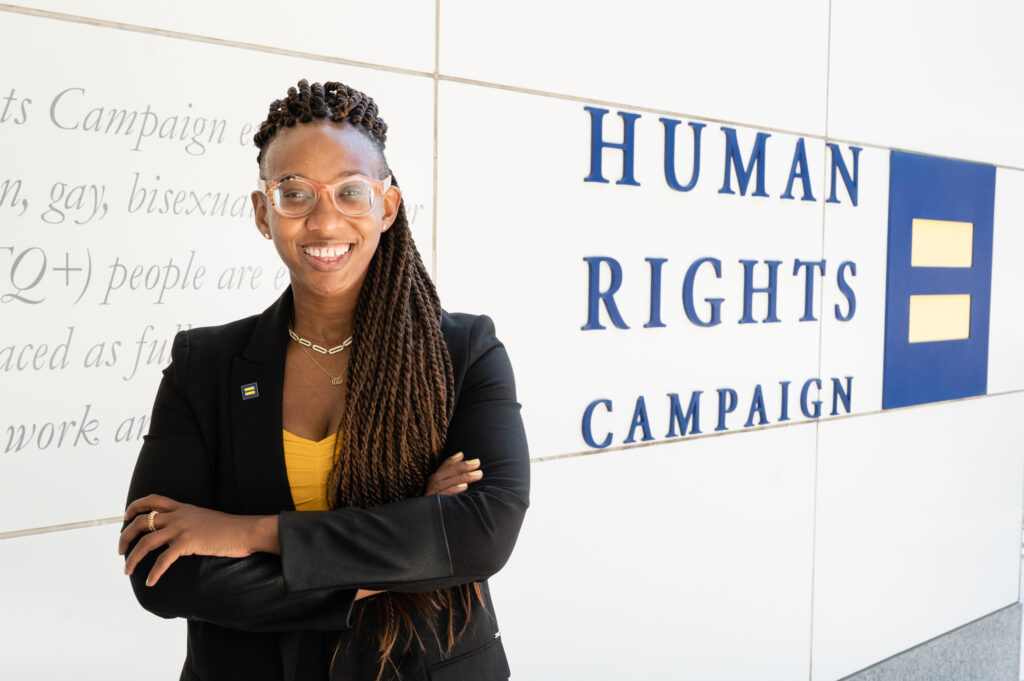Kelley Robinson is on a mission to bring equal rights to all LGBTQ+ people
In September last year, the Human Rights Campaign (HRC) announced that Kelley Robinson would become the organization’s ninth president—and the first Black, queer woman to lead the organization.
The announcement came at a crucial time for the HRC and for the LGBTQ nation. Arguably America’s foremost and most effective LGBTQ advocacy group that shepherded our community through the repeal of “Don’t Ask, Don’t Tell,” the adoption of hate crimes legislation, and the long-awaited victory of federal marriage quality, HRC is under renewed pressure to address the rapidly escalating discrimination against our community, and the epidemic of violence against transgender people, especially of color.
Robinson, who is 36, is a respected activist and organizer who comes to HRC after serving as the Executive Director of the Planned Parenthood Action Fund (PPAF), where she led the organization and its 18 million supporters in efforts to ensure all people have access to sexual and reproductive healthcare as a human right.
After seeing Robinson speak at HRC’s Greater New York Dinner on Feb. 4, and being struck by her energy, optimism, charisma and vision, I wanted to introduce her to Queer Forty readers.
On that night, Robinson took to the podium like it was the pulpit and girl, did she preach!
In her rousing speech Robinson said our community was at a crisis point. The national rollback of rights is fierce and intense and violent, and yet she has never seen more opportunity to achieve full equality. Her positivity was contagious and brought the crowd to its feet. It was a landmark night, not only for us but for other queer women of color who took to the stage that night including Ariana DeBose and Karine Jean-Pierre — and Robinson as well.
“It was really special to me,” she says. “Being in New York that for so many generations felt like one of the only places of possibility for queer people, especially queer people of color — to have their brilliance acknowledged, their creativity acknowledged; it was special to be in that place but also humbling to think about what we have to do to make that true for every place in this country, especially now when we really are a divided nation when it comes to the rights and laws for women, transgender, nonbinary folks, people of color — based on the state that you live in.”
Even though the task ahead may seem overwhelming, one of the things Robinson will remind us of is how far we have come in just a couple of generations. But as she well knows from her time at Planned Parenthood, the repeal of Roe v. Wade and the attack on transgender access to healthcare are part of a large and concerted attack on women’s and LGBTQ+ rights.
“It’s a global crisis. When you look at what’s happening in Russia and in other countries that are led by these ‘strongmen,’ the rise of Donald Trump, there are similar things at play,” she says, giving us the 10,000ft view. “One of the most dangerous things that I see are these blatant attacks on education, trying to eliminate the study of our history and our culture and our people. And these attacks on gender — whether you’re looking at attacks on abortion or trans rights — I do think it’s a global moment but I do think the United States is experiencing an acute crisis that is not really about where the majority of people are, it’s really led by an extremist, small segment of the population that is fighting to hold onto power in the new world.”
And just as digital media has given everybody a soapbox and a voice, it has led to a proliferation of misinformation often driven by a handful of troublesome voices. Division as well as the ability to find kindred spirits is being fueled by online platforms circulating misinformation and conspiracy theories that are galvanizing the right wing. I ask if HRC has any plans in place to tackle these online attacks on our community, in addition to what’s happening in the states.
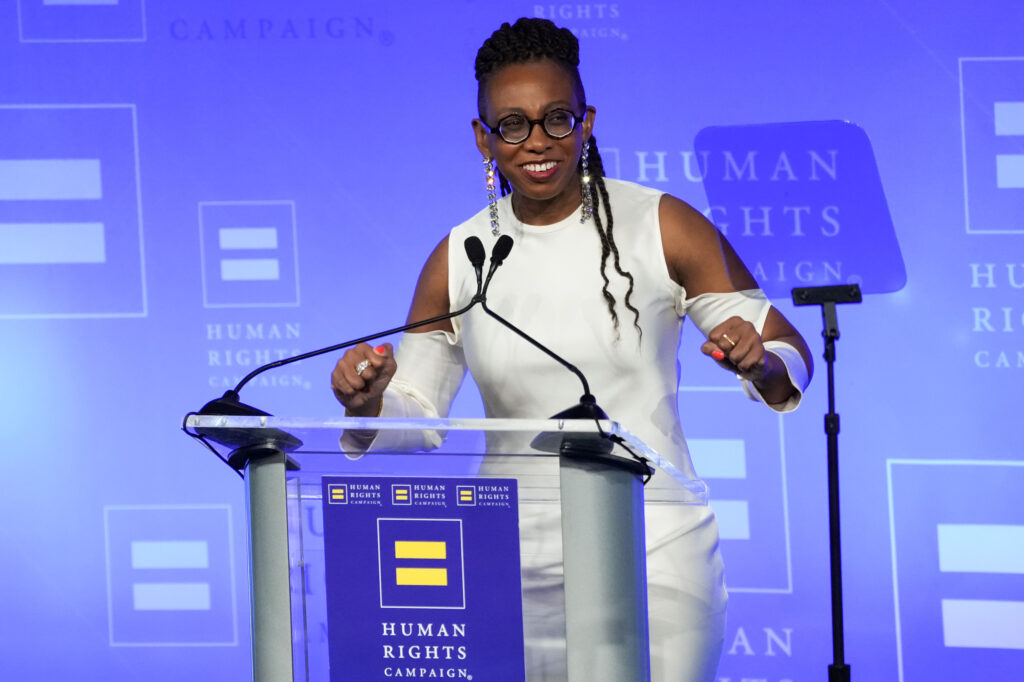
Robinson notes that the passage of the “Don’t Say Gay bill” in Florida was “accompanied by a cruel and vicious social media campaign pushing the language of ‘groomer’ and ‘pedophile’ and targeting the LGBTQ+ community.” HRC observed a 400% increase in hateful language being directed at our community, but this violent rhetoric was being disseminated by a handful of “actors,” some of them paid by the state. There is, she says, a direct and coordinated connection between the state and the attacks occurring via social media. She says that HRC is working with Twitter and Facebook to hold them accountable to their own community standards, guidelines, and protocols.
When you listen to Robinson speak it’s hard not to be struck by her belief that things will get better. She is, in every sense of the word, a progressive. I ask her what was her earliest moment when she realized that action needed to be taken to create positive change and to stave off injustice.
On organizing
“I’m a Black queer woman and I think growing up, especially as a young Black girl you get early lessons that you’re different,” she shares. “When you’re walking around in a grocery store and you’re two or three years old and you’re being told not to put your hands in your pockets because there’s a threat of you being considered as someone who could be shoplifting. That’s not by accident, that’s because of bias. At a young age I definitely learned that the rules were different for someone that was like me. I think it wasn’t until I got to college that I realized that it didn’t have to be that way.”
Robinson’s first professional foray into organizing came with Barack Obama’s presidential campaign in 2008. Robinson recalls: “I remember I came into the campaign office because I was excited about Barack Obama but I stayed because people actually weren’t accepting the status quo; they weren’t accepting these standards of racism and bias that I was taught to adapt to at a young age — they were committed to changing them. And they had a plan to do so. Ever since then I’ve been in love with movement building, with organizing, and with the power of people.”
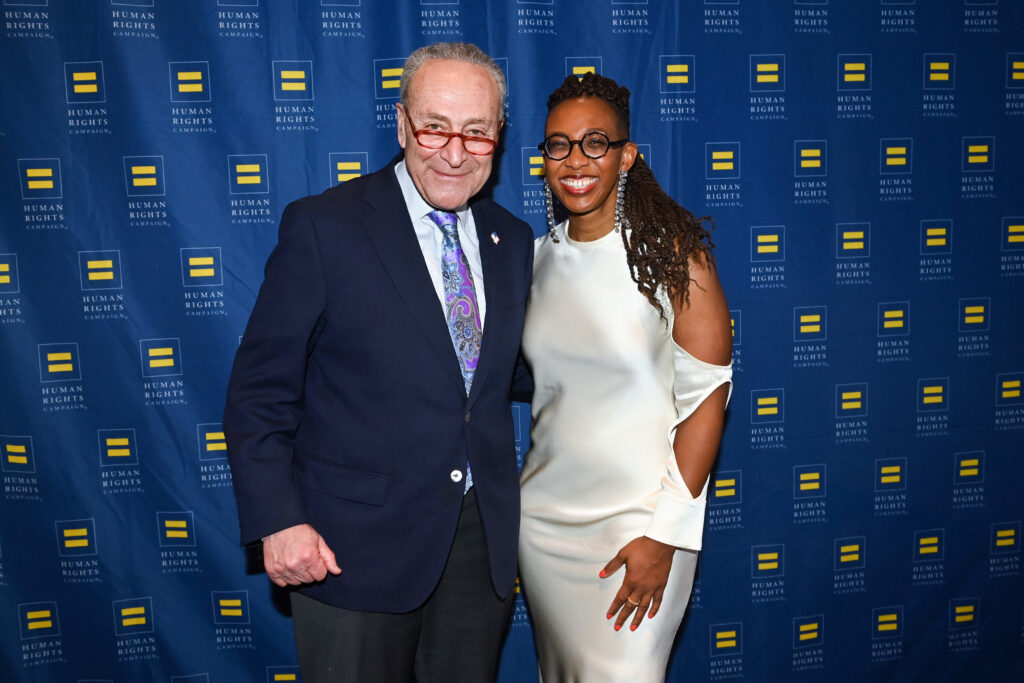
On the Midwest
This understanding of people power — and we don’t mean just the power of those privileged folks on both coasts — comes in part from her Midwestern family lineage. Robinson’s family was the first free Black family in the town of Muscatine, Iowa. (She grew up there and in Chicago.) Her neighborhood in Muscatine was majority Black and Robinson reminded me that far from being a straight, white stronghold, the Midwest has been home to many of America’s cultural transformations. In 1868 Iowa was the first state outside New England to grant African-American men the right to vote. In 2009 Iowa became the third U.S. state to legalize same-sex marriage, after Massachusetts and Connecticut and before California, with an overwhelming majority of Iowans supporting same-sex marriage. In this way, Robinson’s progressiveness connects to the heartland and feels completely genuine. The Midwest is, she says, “a place where real conversations happen, person-to-person. The history of the Iowa Caucuses is about that. It’s a place where real change can occur, where people listen to their neighbors in a way that is precious to me.”
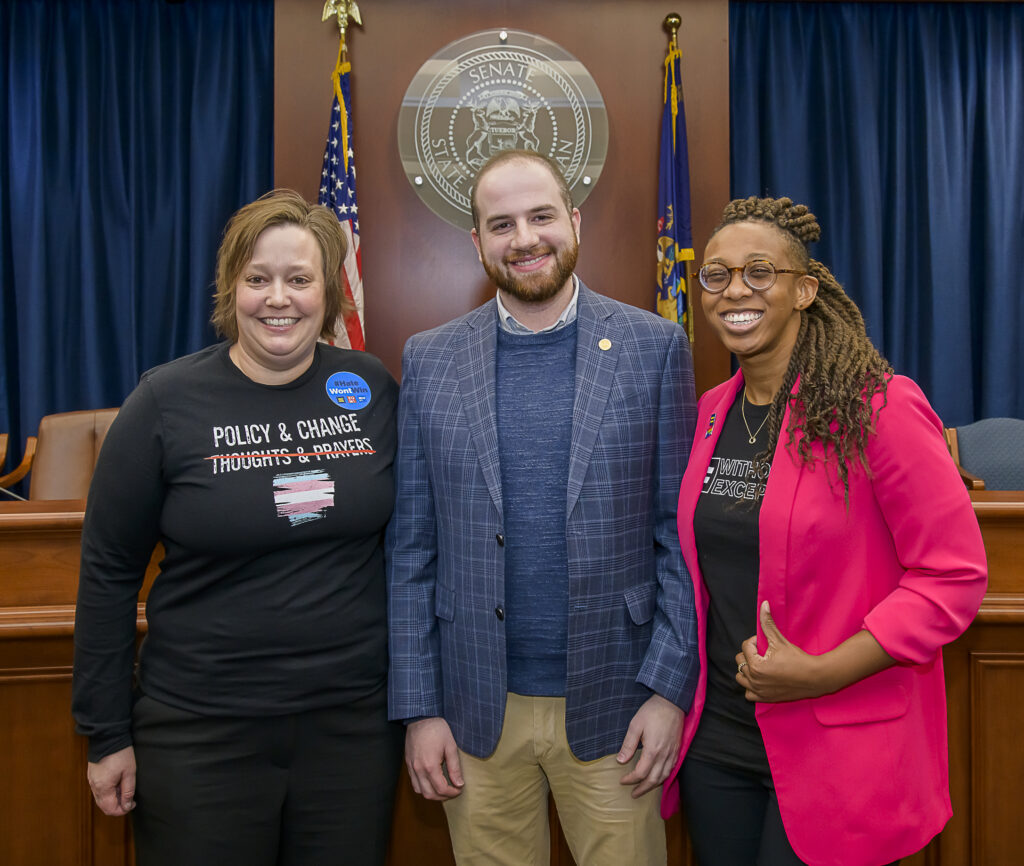
On faith
Growing up in a Black family and in a Black church means that Robinson has people power lessons from those communities and congregations which she brings into our community, right? “Oh, a hundred percent,” she says. “Every day.” While a white agnostic or atheist may overlook the drive of a Black Catholic like Robinson, it’s possible to see that her drive comes from a spirit that has endured. of The full effects and fallout of slavery are barely a few generations past and yet “full liberation and equality for Black queer people in this country” is just around the corner says Robinson. “If that doesn’t show you that anything is possible I don’t know what does,” she says. “I don’t believe that my faith and my people have come this far to not get all the way to full freedom. I’m really proud of my ancestors and proud to continue their legacy of fighting.”
Because faith delivered by organized religion (as opposed to spirituality) has been a sore point for LGBTQ people because of our exclusion from many denominations, and attacks from the religious right who uses religious freedom laws to restrict rights, I ask Robinson how exactly we can use faith as a tool in organizing. Robinson answers: “When I think about faith I really do think about how we find power and strength in others and in community to allow us to believe that something we have not seen yet is possible.
“Many people are actually looking for that sentiment: Where can I restore my faith, my hope in humanity. I truly believe in movement work that happens with each other.”
It’s true. Those moments when we gather as a group, for Pride or for protest, make us feel powerful again. “And the task is,” she says, “to take that feeling that you feel one night in New York or one night in Cincinnati, and feel that way every single day. If we can do that I truly believe that transformation is possible.”
On the current mission
The current mission for HRC under Robinson’s stewardship is to achieve freedom and equality for all, without leaving anyone behind. Having said that, however, some segments of our community are currently more vulnerable and in need than others.
“Everyone has challenges that we are wrestling through, but when I look at the impact on trans people, particularly Black trans women, it is clear that we need an intentional effort to center them — their lives, their joy, their humanity.”
As we all know, 2021 was the deadliest year on record for trans lives. Last year was also a very deadly year. On top of that, there have been 340 anti-LGBTQ bills introduced into legislatures this year, with half of them targeting trans people. “We have to be clear that our opposition is launching an attack,” says Robinson. “it is incumbent upon all of us to stand up and fight. When you center the most marginalized, you actually find greater benefits for everyone. I think that’s the kind of perspective that I take to the fight, that will focus us on what’s most important.”
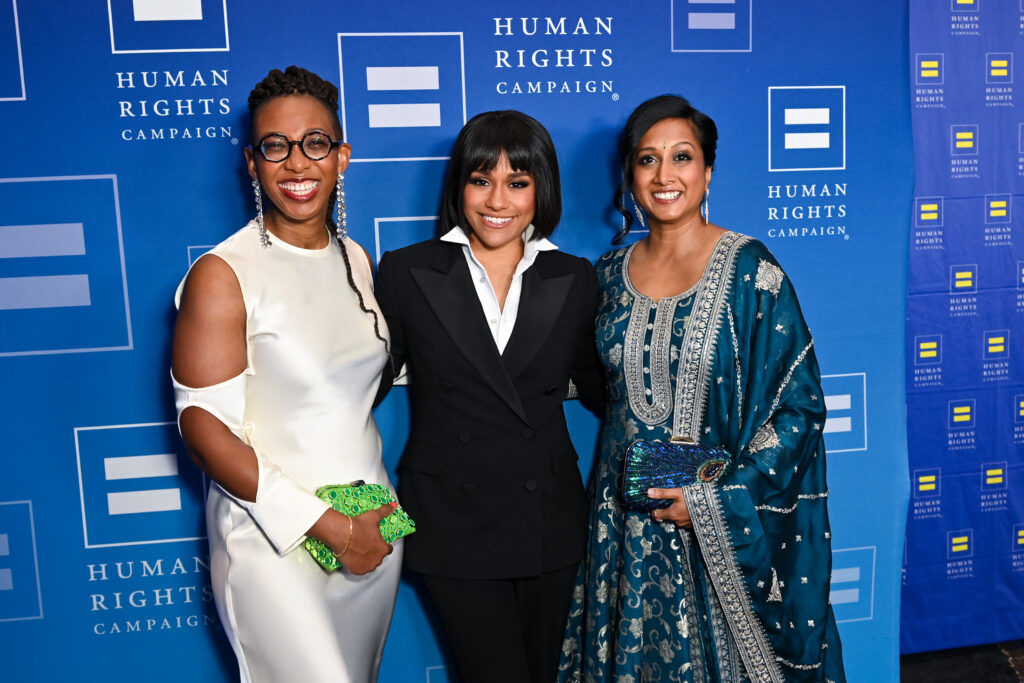
“Last year we came together to defeat 91% of the anti-LGBTQ+ bills,” said Robinson succinctly in a recent press release. “This year we are going to do it again. We see how hateful rhetoric and misinformation about who we are and what we stand for ultimately can translate into real-world violence, real-world harm for our people. We saw that in the aftermath of the Club Q shooting in Colorado. So this year we’re holding politicians to account. We’re ensuring that these anti-LGBTQ+ extremists who are doubling down on a political agenda do not win. We are ensuring that we show them that we are greater than all of their hate. We have the public on our side. We have the strategy on our side, and we have our lives on the line.”
On intersectionality
We have just left Black History Month and we have entered Women’s History Month. Robinson notes that Florida Governor Ron DeSantis put up a Martin Luther King Jr. quote one day, and then posited removing African-American studies courses the next. “I think we have to be very clear that these [months] are intentional opportunities to celebrate the history, the present, the future of these communities; to do it in an intersectional way, so that when we’re talking about women we’re not just talking about white women; when we’re talking about Black folks, we’re talking about women, Black trans folks, men too, Black young people. And to use it as a moment to recommit ourselves to the work we’re going to do all year round. What we don’t want to set up is a false equivalency: If you celebrate Black History Month today you’re off the hook for the rest of the year because it’s not true.”
That word intersectional is something Robinson sees not as a hope or as a theory, but as a tangible practice. She saw it in process while working on the Obama campaign, which found “ways to unite people across race, class, and gender in ways that could be transformative.”
She recalls: “A big piece of the campaign was learning how to tell your story of self, saying who you are, why it matters, and why you’re committed to this fight.”
This concept of bringing your identity into the campaign room is a fundamental organizing principle, she says, inspired in part by Marshall Ganz, and by the Farmworkers’ Movement of Cesar Chavez, which Dr. Martin Luther King supported. It was a successful attempt by Obama to implement intersectionality in the service of change.
On LGBTQ elders
Because Robinson is speaking with Queer Forty, whose core readership is aged 35+, I ask her about the provisions HRC is making for the older members of our community struggling with health and poverty and housing security — sometimes after decades of activism for AIDS, marriage equality, LGBTQ youth and other community causes. Not every gay is, as the stereotype goes, ‘affluent.’
This issue, too, is on Robinson’s radar and she says it is “critically important” to address. HRC has partnered with SAGE to look specifically at retirement homes and elder care facilities and to evaluate them and see if they meet the same standards HRC holds municipalities and corporations to: to look at the institutions that are serving our aging populations and to ensure that they are equitable. HRC is also working on ending the AIDS crisis in our lifetime. And with LGBTQ youth and the “terrifying” youth suicide rates, Robinson says we need to do more, but she is also hopeful.
One in four are now identifying as part of the LGBTQ+ community, and “our job is top translate that into meaningful power. The other part of our job is to make sure we are giving youth the tools that they need today. The reality for young people evolves faster than we can catch up to, the way that the internet is showing up in their lives; the way they are growing up with the reality of online harassment aren’t visible to us sometimes —is critical. So we have to do work to ensure there are the proper safeguards in place to protect young people.”
Robinson recently became a parent herself, with her wife Becky George, who is also a community activist and organizer. Raising a child as a Black queer woman with another queer woman, while leading a national organization that advocates for all genders and identities, Robinson understands that the structure and visibility of her life is the embodiment of decades of activist change, in laws and in policy. “There are so many ways in which we have seen incredible progress, and it’s not by accident. I really do every day wake up honored by what I am able to do because of the people who came before me. I feel really honored to be able to live my life on my own terms,” she says.
And that’s a reality she intends to help bring about for all LGBTQ+ people.
Tune in on March 8 and help Kelley Robinson celebrate her first 100 days at HRC, and her achievements so far!

